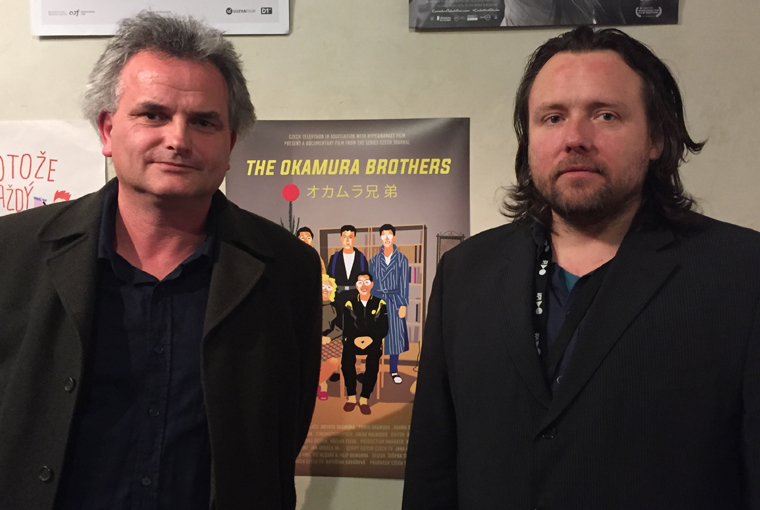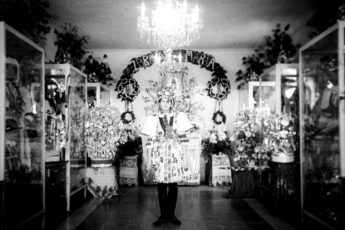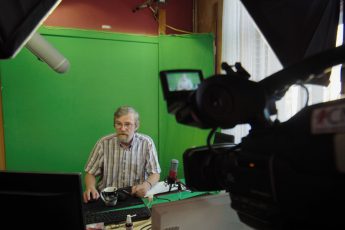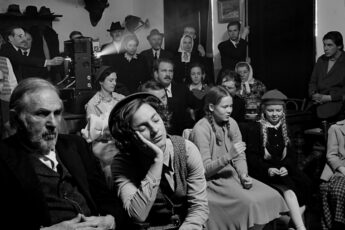
We met documentary filmmaker Filip Remunda and his long-year collaborator and script-editor Jan Gogola at the One World film festival in Prague (March 6-17), where they presented “Okamura Brothers”, a film about three dissimilar brothers from the Czech public sphere. Remunda and Gogola speak about the ideas behind their film and discuss parallels between family and societal life.
Considering your background in independent documentary, how has your work in National Czech Television been as an experience? Have you had to face more limitations?
Remunda (FR): That is a good question because I have had a love-hate relationship. I have had a good relationship because in a sense I am absolutely free when working for television, having faced no limits story-wise. But I also have a hate relationship, because there are limitations regarding the number of days for shooting and editing. I always need a long time to digest a film and then I start becoming creative. But in TV work the framework often puts constraints on that process. This film is maybe affected by that because this is part of the Czech Journal Television series that we developed together with Vít Klusák. Jan Gogola was aboard from the very beginning as well. We call it a series of creative documentaries, but we are constrained by the limited number of shooting days so the style of the documentary is closer to “reportage”. But in general our aim is to go beyond TV news and reportage-style programs and that’s why we call the products films and try and be creative. I appreciate documentary film when things are not declared or said directly by someone, but when you can take the message out of the communication and the behavior of two individuals or a group of people.
Gogola (JG): I’ve worked a lot in Czech television. I really think the difference is the perspective and the preparation. You don’t know if you’ll be able to make these things next year. On the one hand it’s good that Czech Television can allow such films to be made, but it would help if you knew that you can prepare this film 1, 2, 3 years in advance. And we don’t know that.
So the political agenda of these films, which seems quite consistent, comes with each director who is picked to make one? Since you said that you are totally free, and you also co-created this series…
FR: The political agenda is not set by the station. The whole process of selecting themes and directors takes place in our own company. Of course, we then have to discuss it with script editors from Czech TV and they must agree, but I can say that all of the ideas of the films, and there are several films, come from the directors or from us producers. Actually, politicians have recently started to threaten television. They have one important tool, which is financing, and they are smart enough to know that this is a strong tool for controlling public service such as TV, which is financed by the state with public money for the most part. I like this audio-visual set up, but there are voices in the Czech parliament that try to change this system and make television funding come straight from the national budget, which would then mean that it will be directly controlled by the Czech parliament. At this time, the whole film community should co-operate to face this danger together as one organism. What I can understand when it comes to this fear about financing is that it may influence the content. It is easier for television to be less provocative and subversive and then you can negotiate with politicians some kind of status quo. “We will keep financing your films, but please don’t do that…”. I see this as dramatically dangerous and I hope that it won’t happen in reality, although I can already see the signs.
In the film’s summary it says that the film about the Okamura brothers represents the Czech society of today. Is that what you were going for?
FR: We wanted to show the relationship between the family as an organism, and society as an organism. So if you can read some parallels between family and society, that was the aim of our film. To come from something concrete and private to something more general and public and put them together.
On the other hand, we know many people could not care less about politics in the Czech Republic… How typical of Czech society is the family you are depicting? Would you say that politics are a driving mechanism in the private sphere of ordinary people’s lives?
FR: I don’t want all people to be politicians. Let them do what they like… My comparison is just about people being able to communicate together within an organism, as a family. In a wider perspective society is also like family.
JG: I think this film can be an example of a general situation. A situation of more families in the countries. For me the end of the film is very important when Osamu talks about his brother Tomio and says that he is important for people who are isolated from public discourse. So, we can discern something like empathy, personal and social, because of this context. These brothers are not just brothers, but symbols with a particular social status. So, I think that this film is about the description of a situation, and also about ways in which we can overcome it.
FR: Background-wise, the family is not typical. But in a way they can be seen as a typical family in the sense that they are facing the same problems as most Czech families. Although one of them is an architect, he is also a politician, in the sense of being a politician of space. He is an urbanist, he sees human relations in relation to architecture and urban landscape. So, he sees how the place you live in structures social life. He is also a public person, due to his brothers. My goal was to see how different their approaches are. Tomio is calling for a society that’s more closed, atomized, with closed borders and values like nationalism, race superiority etc. Osamu, as a politician of the space, he’s obviously more open and sees that if you want to live in a city, you have to be able to live near someone with whom you’ll strictly disagree and instead of fighting all the time you could search for ways to compromise. Hayato is also trying to be open but not as open as Osamu.
JR: I think this film could be important as it depicts different people coming together. That’s why it’s important that it will be shown on Czech TV and not just in festivals or alternative spaces. We show that there is a common horizon. For Tomio Okamura’s fans, Czech television is an enemy. But some of these people watch TV and I doubt they go to film festivals. This film would be a good possibility to have everyone see it and watch it with some elementary feeling of unity. With internet and Facebook, people are always finding contexts to unite. I hope this film will be seen by half a million people, which is our average broadcast, or even a million if you add online streaming. I’m sure that among these people there are some Tomios and Hayatos, and they can see that Hayato is not so stupid or Tomio is not so reducible to clichés. We can have a social horizon for meeting each other, perhaps not understanding and loving each other, but meeting.
In the film we have the impression of being closer to Hayato and following him more. Even Osamu seems close, unlike Tomio, who did not want to open up to you. Has he seen the film, has he reacted?
FR: Well I just wanted to say that we found some important archive material which portrays him in 2010, when he was more open. Through this you can learn a lot about him, we understand his motivation behind becoming a politician. He said, “I don’t need it, I have money and people who aim to become politicians, they do it to make more money”. Two years later we see him on every billboard, he’s there and probably aiming to have more money! Maybe he understood this is the way to become an even more successful businessman. He’s represented through that, and also through his public speeches which are in the internet but only accessible to his followers. And to come back to what Jan said, most of these followers normally don’t watch TV as they feel they are not being represented. So they might be surprised to watch a film that includes Tomio, together with his views on Europe and the migrant crisis, on TV at 8 pm prime time. We’re curious about how people would react to that. I believe that although he refused twice to be part of my film (and you see these 2 scenes), with the help of this footage, he’s still being represented.
JG: His fans are there too. In the film. So, people will watch this film and see that Filip had a correct relationship with and approach to them. Not making a fool out of them. So, someone who for them represents the establishment, is showing openness to these people, so this is something they will see.
We have to ask a question about provocation as an aesthetic tool. Do you think that there is a risk of feeding into sensationalism by seeking out provocative topics such as right-wing nationalism, populism and Islamophobia, all of which keep reappearing in your series? Your close collaborator Vít Klusák in particular seems to be testing the boundaries of legitimate provocation by constantly helping create situations which he then seeks to delegitimize. His upcoming project lures pedophiles into the trap of talking to underage-looking actresses, and his last film Daliborek ended with him confronting his Neonazi subject after he had accused a Holocaust survivor at Auschwitz of making up stories. Can you invite a Neonazi to Auschwitz and then be appalled at seeing him act the way Neonazis act? Don’t you worry that this kind of method feeds into senseless provocation?
FR: I don’t agree with you at all. We are not talking about tabloid provocation here, there is a bigger meaning to it all. The ending you are alluding to is memento. Of course, Vít Klusák’s film would have worked without the epilogue as well, but it is important because Neonazis travel and tour to concentration camps, taking their selfie pictures there and displaying them online. The other important thing to note is that Daliborek [the Neonazi] wanted to go to Auschwitz himself, so this is not the director’s fantasy. The director is reacting to a situation that already exists. I know that some viewers have an issue with this scene, probably because the place is untouchable and also because of the tragedy behind it, but I think we need to not just praise symbols but reflect about them and allow them to influence us. Of course, I empathize with the survivors, but we also need to understand that Daliborek is able to travel to Auschwitz and tell a survivor to the face some stuff that he heard online. But Jan worked on the film as a script-editor, so maybe he can also share his thoughts.
JG: I have a different opinion than Filip and in fact we disagreed over the epilogue in the crew. As I alluded to during the screening at One World, I also had some disagreements with Filip regarding Okamura Brothers. For instance, I don’t find it right to make the first scene just about Tomio. The film is about three brothers, three people, so it is not right to set the scene with just one of them. As for the scene from Daliborek you are mentioning, I think the epilogue is fine in itself. The real problem – and I think this is the source of your qualifications – is that we don’t really know why these people are going there. We don’t see Daliborek or his mother deciding to go to Auschwitz. As a viewer, you don’t understand what the source of the trip is. I told Vít Klusák that he must make the viewer understand that the idea to go originates with Daliborek and his girlfriend. So there should have been a voice-over in which Vít Klusák says that he heard the idea and wanted to follow Daliborek on his trip. The problem of the epilogue is that we don’t see the beginning of the whole process, so I both agree and disagree that there is a problem.
Thank you for the interview.




Leave a Comment